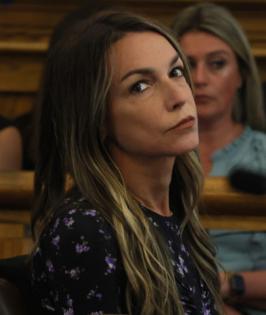ACLU backs Karen Read's appeal of her murder charge
Published in News & Features
BOSTON — The ACLU has jumped into the Karen Read Supreme Judicial Court fight on the side of the accused murderer.
The American Civil Liberties Union of Massachusetts filed a brief in Read’s appeal to Massachusetts’ highest court to have two of the three charges against her — including second-degree murder — dropped in her second trial scheduled for January.
The 28-page brief largely goes over the same ground as Read’s arguments, but this time it comes from a powerful outside party.
“Defendant-Appellant Karen Read faces the possibility of being retried on multiple criminal charges for which numerous jurors now claim they acquitted her,” the brief authored by ACLU attorneys Jessie Rossman and Daniel McFadden and attorney Michael Packard of the Boston firm Quinn Emanuel Urquhart & Sullivan states.
The brief argues for the SJC to vacate trial Judge Beverly J. Cannone’s decision to deny Read’s request to have those charges be dropped and for the trial court to conduct an evidentiary hearing on the matter.
Read, 44, of Mansfield, faces charges of second-degree murder (Count 1), manslaughter while operating a motor vehicle under the influence (Count 2) and leaving the scene of an accident causing death (Count 3). The charges are related to the Jan. 29, 2022, death of John O’Keefe, her boyfriend and a Boston Police officer.
Prosecutors say she struck him with her SUV after heavy drinking and yet another argument in their troubled relationship and left him to freeze and die on a Canton front yard. The defense counters that O’Keefe was killed inside the Canton home his body was found outside of and that Read was framed by a massive police and prosecutor cover-up.
A trial was held earlier this year but ended after nine weeks with Judge Cannone declaring a mistrial on July 1 when she had received a third note from the jury indicating that they were deadlocked.
“Despite our rigorous efforts we continue to find ourselves at an impasse,” the jury foreman wrote in that note.
The ACLU’s brief called that a “hasty mistrial declaration” and found fault in Cannone’s handling of the event.
“The court did so without polling jurors to confirm they were deadlocked on all counts (or even asking the parties whether they consented to a mistrial or wanted the jurors polled),” the brief states.
Not too long after the mistrial, Read’s lawyers submitted a motion to have Counts 1 and 3 dismissed in the next trial as five jurors had allegedly come forward to say that the jury was unanimously ready to acquit Read on those charges and were actually only deadlocked on Count 2 and didn’t know they could make a finding on the others alone. Read appellate attorney Martin Weinberg also implored Cannone to bring the jurors back in and poll them.
“But the trial court denied the motion to dismiss and refused to conduct a hearing—leaving open the possibility of Appellant being retried in violation of her right to be free from double jeopardy,” the ACLU brief summarizes.
“The trial court had a clear path to avoid an erroneous mistrial: simply ask the jurors to confirm whether a verdict had been reached on any count. Asking those questions before declaring a mistrial is permitted—even encouraged—by Massachusetts rules. Such polling serves to ensure a jury’s views are accurately conveyed to the court, the parties, and the community—and that defendants’ related trial rights are secure,” the brief states.
_____
©2024 MediaNews Group, Inc. Visit at bostonherald.com. Distributed by Tribune Content Agency, LLC.







Comments